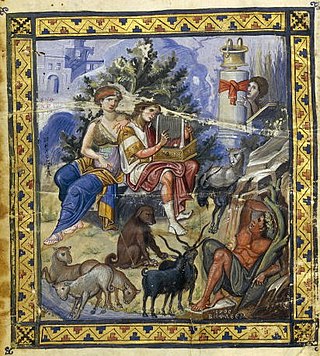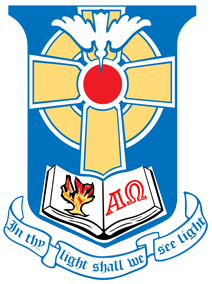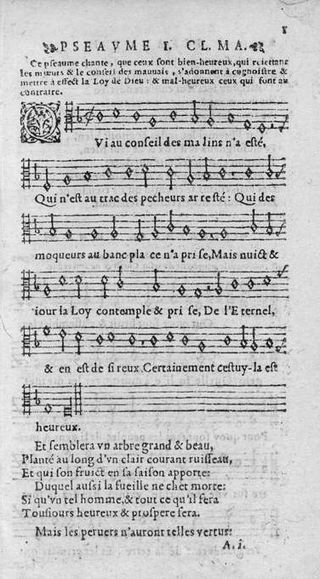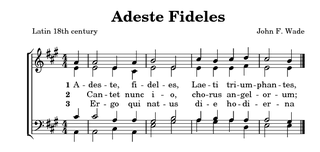Presbyterian worship documents worship practices in Presbyterian churches; in this case, the practices of the many churches descended from the Scottish Presbyterian church at the time of the Reformation.
Historically, the driving principle in the development of the standards of Presbyterian worship is the regulative principle of worship, which specifies that (in worship), what is not commanded is forbidden. [1]
In addition to those detailed in the History section below, Presbyterians also historically have held the following Worship positions:
At the start of the Scottish Reformation in 1560 there was no Reformed standard for worship in Scotland, so the shape the Church initially took was dependent on local Protestant patrons. [2]
Writing from exile in Geneva, John Knox described in detail what should be done at weekly worship in a 'Letter of Wholesome Councell' dated 1556. Protestant preachers fleeing Marian persecutions in England brought with them Edward VI's second Book of Common Prayer (of 1552), which was commended by the Lords of the Congregation. Knox too initially supported it (indeed reportedly, he had influenced aspects of it). However, before leaving Geneva and with the encouragement of John Calvin, he had written his own 'Book of Common Order' and it was this that was printed and approved by the General Assembly of 1562. Enlarged, it was reprinted with the Confession and the Psalms in metre in 1564, and it remained the standard until replaced with the Westminster Directory in 1643. [2]
The Regulative principle of worship (see Theology of Worship, above) saw many of the previous practices (inherited from the Roman Catholic church) cast aside. Two major points which might be unusual by today's standards were:
Both of these were introduced, at least partly, to prevent the singing of hymns to Mary and the Saints.
In early times the common method of singing in Presbyterian worship, was lining out, where a precentor read or sang one line and the congregation repeated it after them. The Directory of Public Worship, [4] says this:
It appears from the wording that this was a practical measure in 1650, not a doctrinal position. Lining out was used by other denominations as well for the practical reasons that many people were not sufficiently literate or because of a lack of hymnals.
From around 1720 onwards, many advocated the introduction of continuous (or regular) singing. [5] Continuous singing was introduced into many Presbyterian churches worldwide, even those that consider themselves to be following the traditional Presbyterian line on worship; there are some, who still practise lining out, such as the Steelites.
In this context, "hymns" means hymns that are not part of the Bible; the word "hymn" is used in the Bible, but it is claimed by advocates of exclusive psalmody that this refers to a specific type of psalm. [6]
After singing psalms for 200 years, in 1861 the Church of Scotland first formally adopted hymns, with the Free Church of Scotland doing the same in 1872. [7] Hymns and other extra-biblical words are now widely used in Presbyterian circles; the details vary from denomination to denomination.
In the early nineteenth century, R. William Ritchie of St. Andrew's Church, Glasgow, attempted to introduce an organ into his church, but was informed by the Presbytery of Glasgow that "the use of organs in the public worship of God is contrary to the law of the land and constitution of our Established Church." [8]
In 1863, Robert Lee introduced a harmonium into worship at Greyfriars Kirk, Edinburgh. Lee defended instrumental music at the 1864 General Assembly, who declared that "such innovations should only be put down when they interfered with the peace of the Church and harmony of congregations". A pipe organ was subsequently installed in Greyfriars, and first used in 1865. [9]
Presbyterian churches practice worship the Triune God: Father, Son, and Holy Spirit. This occurs every Sunday (Lords Day). Other services often occur at other times of the week as well as meetings for prayer and Bible Study or simply mid week chapel with communion being served. Most mainline Presbyterians use hymns and with some additions to more modern worship songs being introduced or part of a blended service. Most modern day Presbyterians do not strictly sing Psalms as some once did. John Calvin in Geneva used biblical psalms almost exclusively in the Genevan Psalter, though it contained some gospel canticles and catechetical songs. This psalter was to become a prototype for Reformed worship, but Calvin did not have any objection to the use of original hymns in other churches, and he did not appeal to scripture in his preface to the psalter justifying his preference for the Psalms.[1]: 42, 45
Other Presbyterian denominations hold exclusively to the psalms in metre. The psalms in metre are still esteemed by worship leaders in the Church of Scotland while also recognizing the contribution of authors of hymns and worship songs from historic times to the contemporary. Use of contemporary worship songs is employed by some more independent or evangelical congregations within Presbyterianism.
John Calvin's direction for celebration of Holy Communion was every Lord's Day. [10] During the time of the Puritan influence upon some Presbyterians, worship and the celebration of the Eucharist became lessened to once per quarter. This has changed in most mainline Presbyterian denominational churches and celebration of Communion ranges from once a quarter to once a month to every Sunday or Lord's Day Service. This movement is carried forward by those who believe that Word and Sacrament should be present in each service of worship. The Real Presence of Christ (spiritually) is highly viewed and understood. Presbyterians strongly disagree with simply the symbolic or memorial service as taught by many Anabaptists, but do not go as far as the sacramental union view of Lutherans. Presbyterians hold the "Spiritual Real Presence" of Christ in the sacrament of Communion. Today most mainline Presbyterian churches administer Communion by either passing the elements or by intinction.
Over subsequent centuries, many Presbyterian churches modified these prescriptions by introducing hymnody, instrumental accompaniment, and ceremonial vestments into worship. However, there is not one fixed "Presbyterian" worship style. Although there are set services for the Lord's Day in keeping with first-day Sabbatarianism,[24] one can find a service to be evangelical and even revivalist in tone (especially in some conservative denominations), or strongly liturgical, approximating the practices of Lutheranism or more of Anglicanism (especially where Scottish tradition is esteemed),[clarification needed] or semi-formal, allowing for a balance of hymns, preaching, and congregational participation (favored by probably most American Presbyterians).
Most Presbyterian churches follow the traditional liturgical year and observe the traditional holidays, holy seasons, such as Advent, Christmas, Ash Wednesday, Holy Week, Easter, Pentecost, etc. They also make use of the appropriate seasonal liturgical colors, etc. Many incorporate ancient liturgical prayers and responses into the communion services and follow a daily, seasonal, and festival lectionary. Other Presbyterians, however, such as the Reformed Presbyterians, would practice a cappella exclusive psalmody, as well as eschew the celebration of holy days.
Among the paleo-orthodox and emerging church movements in Protestant and evangelical churches, in which some Presbyterians are involved, clergy are moving away from the traditional black Geneva gown to such vestments as the alb and chasuble, but also cassock and surplice (typically a full-length Old English style surplice which resembles the Celtic alb, an ungirdled liturgical tunic of the old Gallican Rite), which some, particularly those identifying with the Liturgical Renewal Movement, hold to be more ancient and representative of a more ecumenical past.
Presbyterians admit the authority of the Presbytery or Synod over all worship services in order to ensure that the worship of God, Father Son and Holy Spirit, is carried on properly and regularly in each congregation within the 'bounds' (area of jurisdiction). This is done by the appointment of Ministers by the Presbytery, who can also dismiss (depose) the Ministers should their conduct of regular worship be unsatisfactory. In modern times an effective presbytery is a forum for discussing and disseminating approaches to worship, always recognizing the supreme authority of the Word of God (Old and New Testaments of the Bible).
In the Church of Scotland, the cancellation of any regular service of worship is a serious matter. Services are carried out even by small rural congregations in the most extreme weather and under conditions of power failure and other privations. Elders, teaching and ruling, make every effort to ensure continuity or worship in every parish of Scotland at the published times.

The Book of Psalms, also known as the Psalms, or the Psalter, is the first book of the third section of the Tanakh called Ketuvim ("Writings"), and a book of the Old Testament.

Presbyterianism is a Reformed (Calvinist) Protestant tradition named for its form of church government by representative assemblies of elders. Though there are other Reformed churches that are structurally similar, the word Presbyterian is applied to churches that trace their roots to the Church of Scotland or to English Dissenter groups that formed during the English Civil War.

The Associate Reformed Presbyterian Church (ARPC) is a theologically conservative denomination in North America. The ARPC was formed by the merger of the Associate Presbytery (seceder) with the Reformed Presbytery (covenanter) in 1782. It is one of the oldest conservative denominations in the United States.

A metrical psalter is a kind of Bible translation: a book containing a verse translation of all or part of the Book of Psalms in vernacular poetry, meant to be sung as hymns in a church. Some metrical psalters include melodies or harmonisations. The composition of metrical psalters was a large enterprise of the Protestant Reformation, especially in its Calvinist manifestation.
Christian liturgy is a pattern for worship used by a Christian congregation or denomination on a regular basis. The term liturgy comes from Greek and means "public work". Within Christianity, liturgies descending from the same region, denomination, or culture are described as ritual families.

In Christianity, worship is the act of attributing reverent honour and homage to God. In the New Testament, various words are used to refer to the term worship. One is proskuneo which means to bow down to God or kings.
The Free Church of Scotland is a conservative evangelical Calvinist denomination in Scotland. It is the continuation of the original Free Church of Scotland that remained outside the union with the United Presbyterian Church of Scotland in 1900, and remains a distinct Presbyterian denomination in Scotland.
Decisions concerning the conduct of public worship in the Church of Scotland are entirely at the discretion of the parish minister. As a result, a wide variety of musical resources are used. However, at various times in its history, the General Assembly has commissioned volumes of psalms and hymns for use by congregations.

Exclusive psalmody is the practice of singing only the biblical Psalms in congregational singing as worship. Today it is practised by several Protestant, especially Reformed denominations. Hymns besides the Psalms have been composed by Christians since the earliest days of the church, but psalms were preferred by the early church and used almost exclusively until the end of the fourth century. During the Protestant Reformation, Martin Luther and many other reformers, including those associated with the Reformed tradition, used hymns as well as psalms, but John Calvin preferred the Psalms and they were the only music allowed for worship in Geneva. This became the norm for the next 200 years of Reformed worship. Hymnody became acceptable again for the Reformed in the middle of the nineteenth century, though several denominations, notably the Reformed Presbyterians, continue the practice of exclusive psalmody.

The Genevan Psalter, also known as the Huguenot Psalter, is a 1539 metrical psalter in French created under the supervision of John Calvin for liturgical use by the Reformed churches of the city of Geneva in the sixteenth century.

A hymn tune is the melody of a musical composition to which a hymn text is sung. Musically speaking, a hymn is generally understood to have four-part harmony, a fast harmonic rhythm, with or without refrain or chorus.

A liturgical book, or service book, is a book published by the authority of a church body that contains the text and directions for the liturgy of its official religious services.
Gelineau psalmody is a method of singing the Psalms that was developed in France by Catholic Jesuit priest Joseph Gelineau around 1953, with English translations appearing some ten years later. Its chief distinctives are:

The Reformed Presbyterian Church of North America (RPCNA) is a Presbyterian church with congregations and missions throughout the United States, Japan, and Chile. Its beliefs—held in common with other members of the Reformed Presbyterian Global Alliance—place it in the conservative wing of the Reformed family of Protestant churches. Below the Bible—which is held as divinely inspired and without error—the church is committed to several "subordinate standards," together considered with its constitution: the Westminster Confession of Faith and Larger and Shorter Catechisms, along with its Testimony, Directory for Church Government, the Book of Discipline, and Directory for Worship.

The regulative principle of worship is a Christian doctrine, held by some Calvinists and Anabaptists, that God commands churches to conduct public services of worship using certain distinct elements affirmatively found in scripture, and conversely, that God prohibits any and all other practices in public worship. The doctrine further determines these affirmed elements to be those set forth in scripture by express commands or examples or, if not expressed, those implied logically by good and necessary consequence. The regulative principle thus provides a governing concept of worship as obedience to God, identifies the set of specific practical elements constituting obedient worship, and identifies and excludes disobedient practices.

The Reformed Presbyterian Global Alliance is a communion of Presbyterians originating in Scotland in 1690 when its members refused to conform to the establishment of the Church of Scotland. The Reformed Presbyterian churches collectively have approximately 9,500 members worldwide in Northern Ireland, the Republic of Ireland, Scotland, France, the United States of America, Canada, Japan, South Sudan, and Australia.
Reformed worship is religious devotion to God as conducted by Reformed or Calvinistic Christians, including Presbyterians. Despite considerable local and national variation, public worship in most Reformed and Presbyterian churches is governed by the Regulative principle of worship.

Church music in Scotland includes all musical composition and performance of music in the context of Christian worship in Scotland, from the beginnings of Christianisation in the fifth century, to the present day. The sources for Scottish Medieval music are extremely limited due to factors including a turbulent political history, the destructive practices of the Scottish Reformation, the climate and the relatively late arrival of music printing. In the early Middle Ages, ecclesiastical music was dominated by monophonic plainchant, which led to the development of a distinct form of liturgical Celtic chant. It was superseded from the eleventh century by more complex Gregorian chant. In the High Middle Ages, the need for large numbers of singing priests to fulfill the obligations of church services led to the foundation of a system of song schools, to train boys as choristers and priests. From the thirteenth century, Scottish church music was increasingly influenced by continental developments. Monophony was replaced from the fourteenth century by the Ars Nova consisting of complex polyphony. Survivals of works from the first half of the sixteenth century indicate the quality and scope of music that was undertaken at the end of the Medieval period. The outstanding Scottish composer of the first half of the sixteenth century was Robert Carver, who produced complex polyphonic music.
Church music during the Reformation developed during the Protestant Reformation in two schools of thought, the regulative and normative principles of worship, based on reformers John Calvin and Martin Luther. They derived their concepts in response to the Catholic church music, which they found distracting and too ornate. Both principles also pursued use of the native tongue, either alongside or in place of liturgical Latin.

The Scottish Psalter of 1564 was the first psalter or psalm book to be published in Scotland. It was published by the Church of Scotland under the influence of John Knox as part of the Book of Common Order which was a more general directory for public worship. The precise details concerning the publication of the Scottish Psalter are not known as the early records of the Church of Scotland are lost. However, it appears that its publication was determined at the Church's General Assembly in December 1562.